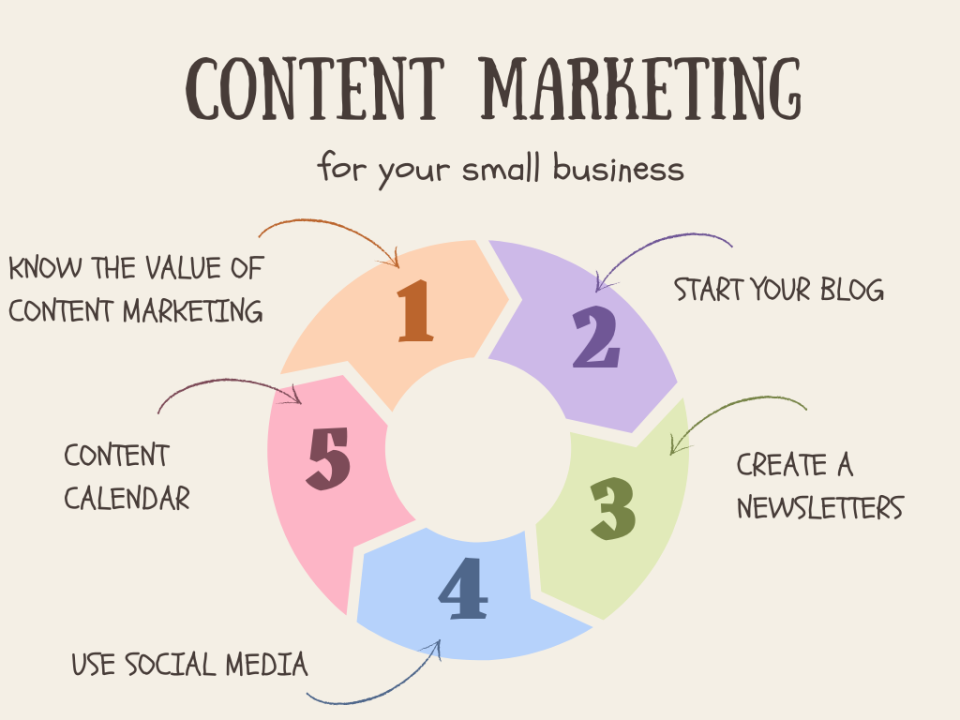Content marketing is a powerful tool for small businesses looking to grow their online presence and attract customers. With the right strategies, even small budgets can yield impressive results. Here’s how small businesses can effectively leverage content marketing to boost their brand and drive growth.

Define Your Goals and Audience
Before creating content, establish clear goals for your content marketing efforts. Whether it’s increasing brand awareness, generating leads, or boosting sales, having specific objectives helps guide your strategy. Next, identify your target audience. Understanding their interests, needs, and behaviors allows you to create content that resonates and engages them effectively.
Develop a Content Plan
A well-organized content plan is crucial for consistent and effective content marketing. Outline the types of content you’ll create, such as blog posts, videos, infographics, or social media updates. Create a content calendar to schedule and manage your content production and publication. Planning in advance ensures a steady flow of content and helps maintain consistency.
Create Valuable and Relevant Content
To capture your audience’s attention, focus on creating content that provides value. Address common questions, solve problems, and offer insights relevant to your industry. High-quality content establishes your business as an authority in your field and builds trust with your audience. Aim to educate, entertain, or inspire your readers through well-researched and engaging content.
Utilize SEO Best Practices
Search Engine Optimization (SEO) enhances the visibility of your content in search engine results. Conduct keyword research to identify relevant terms and phrases your audience is searching for. Incorporate these keywords naturally into your content, including titles, headings, and meta descriptions. Optimizing your content for SEO helps drive organic traffic to your website and improves your search rankings.
Leverage Social Media Platforms
Social media is a valuable tool for distributing your content and engaging with your audience. Choose platforms that align with your target audience’s preferences. Share your content regularly and interact with followers to build relationships and encourage engagement. Use social media analytics to track the performance of your posts and adjust your strategy as needed.
Collaborate with Influencers
Partnering with influencers can expand your reach and enhance your credibility. Identify influencers in your industry who have a relevant and engaged following. Collaborate on content such as guest blog posts, social media takeovers, or product reviews. Influencers can help amplify your message and introduce your brand to new audiences.
Monitor and Analyze Performance
Tracking the performance of your content marketing efforts is essential for continuous improvement. Use analytics tools to monitor metrics such as website traffic, engagement rates, and conversion rates. Analyze this data to understand what’s working and what needs adjustment. Regularly reviewing your performance helps refine your strategy and optimize results.
Encourage User-Generated Content
User-generated content (UGC) is a valuable asset for small businesses. Encourage your customers to share their experiences, reviews, and testimonials. UGC not only provides social proof but also fosters a sense of community around your brand. Highlighting customer content can enhance authenticity and drive engagement.
Adapt and Innovate
Content marketing is dynamic and continually evolving. Stay informed about industry trends and emerging technologies. Be open to experimenting with new content formats and strategies to keep your audience engaged. Adapting to changes and innovating ensures your content marketing efforts remain effective and relevant.
Conclusion
Effective content marketing strategies can significantly benefit small businesses by increasing brand visibility and driving customer engagement. By defining clear goals, creating valuable content, optimizing for SEO, and leveraging social media, small businesses can successfully compete and grow in today’s digital landscape. Regularly monitor performance and stay adaptable to maintain a competitive edge.




